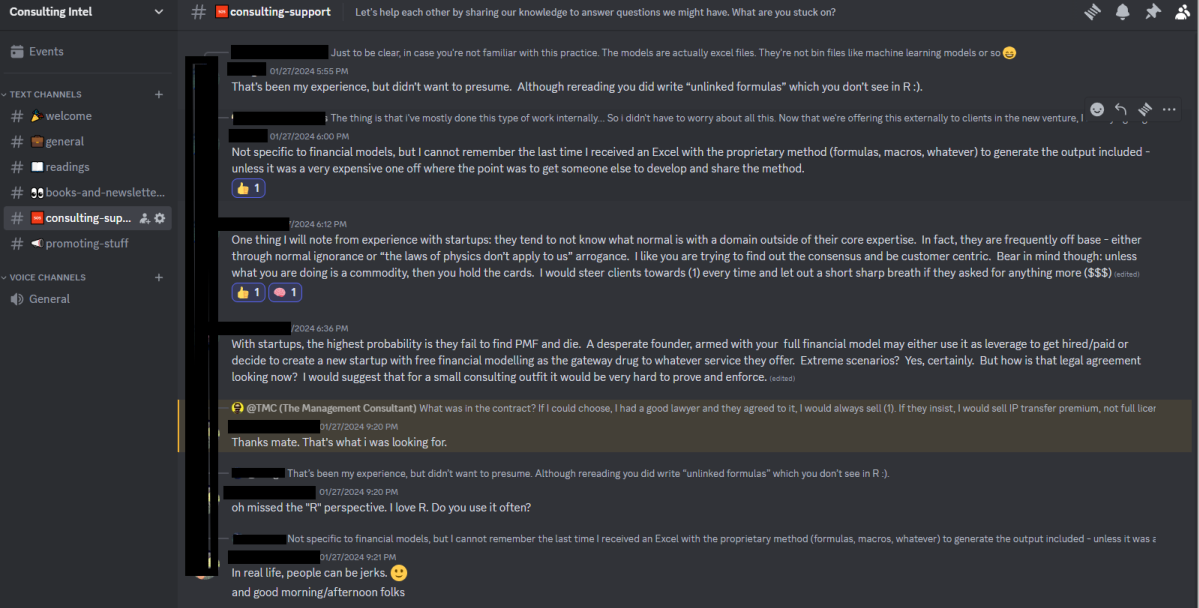Delivery // Sales: a seesaw dynamic
How does AI impact the Delivery and Sales balancing act?
Hello to the 1,753 subscribers who read Consulting Intel!
You have fine-tuned a groundbreaking offering that can improve your client’s business substantially.
You have assembled a dream team of expert practitioners ready to deliver exceptional results.
You are within reach of that coveted promotion, bonus, or a long-term contract.
Except… there’s a catch: No one knows about your service!
No one has bought into it.
Without sales, all your delivery potential happens to be just that – potential.
This brings us to a question as old as business itself: what drives the well-being and growth of an organization more, sales or delivery?
For me, the answer is clear. You cannot deliver what you didn’t sell.
Securing a sale is the most challenging yet critical job in any professional services business. Without the sale, there is nothing to deliver.
No matter how stellar your delivery capabilities are, they mean nothing if there is no client to leverage them.
Sales hold the key to opening up your organization’s true potential - without it, your hyped delivery stays an unfulfilled promise.
The essence of sales
Selling a service can vary in difficulty based on several factors, but it does get easier if you:
Offer competitive prices
Actively seek out new leads
Employ a persuasive sales force
Have a strong reputation for delivery
Demonstrate clear value propositions
Provide genuinely exceptional customer service
Leverage existing client relationships and referrals
Understand and address the right client pain points
Maintain a robust online presence and brand visibility
A good market reputation for delivering on promises can certainly make leads easier to convert, but the fundamental truth remains: you can’t deliver what you haven’t sold.
Traditionally, the path to climbing the corporate ladder in a consulting firm and reaching the lauded Partner position hinges on sales.
In the early stages of your career, your delivery capabilities matter most. However, as you progress, the ability to sell becomes paramount.
Your personal growth in the organization is tied directly to your ability to grow the business. In simpler terms, you can only grow if you sell because the firm’s reputation for delivering quality value won’t matter if there is no project to add value toward.
Over the years, many consulting firms have tried to address the challenge of retaining non-sales-oriented senior professionals in their teams. They have introduced roles that cater to individuals who excel in their jobs and are valuable to the company but are not interested in (or good at) selling.
While these individuals may not become Partners, they can achieve seniority comparable to their sales-focused counterparts as Master Architects or Expert Directors (as some firms call them).
This approach is a win-win.
It allows a consultancy to avoid attrition of valuable talent by recognizing their contributions through titles and remuneration, preventing them from moving to competitors who might value their expertise more.
Sales and Delivery: evolution in an AI-first world
In a consulting firm every consultant, from the most junior to the most senior, has a role in selling while delivering.
This responsibility manifests differently at various career stages.
At junior levels, “selling” might mean being a reliable team member who takes on challenging tasks and delivers exceptional results for clients (the “safe pair of hands”, an expression one of my managers once used to describe me in my first or second performance review ever!).
At senior levels, “selling” involves forming high-performing teams that deliver on promises based on a deep understanding of clients’ real problems.
Both roles are challenging in their own right.
And both roles are about to change.
Looking ahead a decade or so, the value of commodity delivery is set to diminish. Bear in mind that my perspective comes from years of technology-driven work, but these considerations also apply to adjacent industries.
Basic (or even advanced) coding skills are going to become a commodity. Automation will become pervasive, even in large enterprises.
However, the true heroes of the future in the services industry are set to be the ones who excel in pursuing and sealing the deal.
Here’s where it gets counterintuitive.
It is not out of the left field to think that automation, machine learning, and AI-driven processes will streamline and optimize delivery functions, reducing manual intervention and lowering overall operational costs. This shift is on the path to making coding skills more accessible and largely commoditized.
Hence, one might assume that AI only impacts the delivery function. However AI, in its current trajectory, transforms sales too.
AI can empower sales teams with unprecedented insights and tools, enabling them to:
Predict client needs with greater accuracy
Personalize pitches and proposals at scale
Analyze vast amounts of data to identify high-potential leads
Automate routine tasks, allowing salespeople to focus on building relationships and closing deals
Enhance decision-making with real-time analytics and predictive modeling.
As delivery becomes more automated, the human touch in sales can be expected to become even more paramount and critical.
The constant
The ability to connect with clients personally, understand their unique challenges, and offer tailored solutions will set successful consultants and consultancies apart. AI is going to augment sales capabilities, but the essence of selling - building trust, demonstrating value, and forming lasting relationships - will remain inherently human.
In an AI-driven future, while delivery might be streamlined and enhanced by technology, the art of selling is expected to stand out as the defining skill.
You cannot deliver what you didn’t sell because sales are the lifeblood of any professional services firm. This selling capability, enhanced by AI, will keep driving the future of consulting and professional services.
So, what drives the well-being and growth of an organization more, sales or delivery?
I gave you my answer.
What is yours? Let me know in the comments.
✍ The Management Consultant
PS: If you like this newsletter, I have one huge favor to ask.
Share it around with friends, family and colleagues.
This is the most effective way to support me (…and to keep me motivated to continue writing 😁).
Thank you 👇👇👇
🎯 INTERESTING SH*T
A few things I found on the internet that you may like…
I love Shaan Puri and Sam Parr’s My First Million Podcast. This episode with Mohnish Pabrai is excellent:
Similar theme… One of best interviews with Warren Buffett. You might not believe it, but Berkshire Hathaway shares are up more than 13,800% since this video from 1988.
🚨 SPONSORSHIP
Consulting Intel is read by more than 1,700 consultants globally.
The readers include management consultants from McKinsey, BCG, Bain, Deloitte, EY, EY-Parthenon, KPMG, PwC, Accenture, Oliver Wyman, PA Consulting, and various boutique consultancies worldwide.
Many corporate employees and independent consultants are regular readers of Consulting Intel.
If you think your products or services could resonate with this audience, get in touch!
👀 JOIN THE DISCORD SERVER
If you like this newsletter, you will love our Discord Server.
In there, you will find a tight-knit community of more than 100 management consultants from all over the world discussing real-life challenges, giving each other support and recommending the good stuff to keep our knowledge top notch.






Love this post and I can’t understand how it isn’t business 101 or common sense. I have seen models in professional services where those responsible for delivering are also responsible for sales. Then management think they’ve nailed it. It never works. At best, it ensures retention and growth of existing clients but without a steady stream of new business (which delivery people are not focused on and it’s not fair to expect them to be) you put your business at risk. Clients fall off for reasons outside of your control and without a sales engine to buffer that you are in for decline or limited to your current clients’ spending potential- not your own.